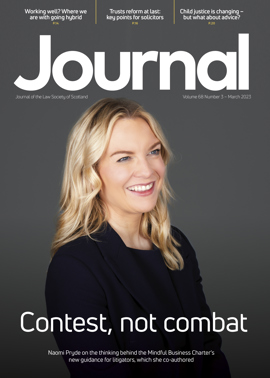Litigating the mindful way

I read Edward Gratwick’s opinion article last month with interest (Journal, February 2023, 5). It was a timely piece, as it has coincided nicely with the launch of the Mindful Business Charter’s Guidance for Litigation Professionals. Subtitled “Rehumanising Litigation”, the guidance seeks to address exactly the type of behaviour addressed in the article.
Litigation is, by its nature, contentious and adversarial. However, it is the view of the taskforce of senior litigators who prepared the litigation guidance (Huw Jenkin, James Boon, Katie Byrne, Luke Maunder, Mani Gupta, Richard Martin, Stephanie Lee, Stephen Innes and myself), that this need not preclude co-operation.
Litigation can be stressful, and emotionally charged, with tight court deadlines and clients who are keen for their legal representative to adopt an “aggressive” approach. However an aggressive, or robust, strategy to resolve a dispute does not mean that a litigator needs to adopt aggressive conduct.
I am fascinated by psychology and neurobiology and the effect that our thinking can have on our mental and physical wellbeing. In the MBC Guidance for Litigation Professionals we touch on the amygdala (the part of the brain that regulates our approach to threat). Litigation, given its adversarial nature, is arguably more prone than other legal disciplines to involve behaviour that we are, often unconsciously, likely to perceive as a threat.
Years ago, it was seen as a badge of honour to be described as a “rottweiler” or an aggressive litigator. I had it said to me, on more than one occasion, that I’m too “nice” to be a litigator. However, time has moved on, and more and more clients are seeking to adopt a more collaborative approach to litigation. This approach preserves not only the sanity of those involved, but indeed important commercial relationships between the parties in dispute.
Framework of principles
The Mindful Business Charter is a permissive framework to guide individuals and organisations to work in more mindful ways, so as to reduce the unnecessary stress experienced in work and promote healthier and more effective ways of working. Our guidance applies that approach to the conduct of litigation.
Made up of eight statements of principle for practitioners to keep in mind, it provides a series of example scenarios which explore the application of those principles to a range of commonly experienced circumstances in litigation. The guidance is not mandatory, nor does it seek to prescribe particular actions or behaviours, but rather to encourage mindful consideration and good practice, to help improve wellbeing and indeed mindfulness in the legal profession.
Set out more fully in the panel opposite, its principles centre around the nature of litigation, and our role and duties as practitioners, behaving objectively and dispassionately, behaving with respect, and being mindful of our own impact. The principles discuss strategy versus conduct, and encourage reflection. The guidance is effectively a call to arms for the profession, encouraging everyone to take responsibility to effect meaningful change for the better administration of justice.
We of course recognise that sometimes long and unsociable hours are required in law, and that some level of stress is inherent. However, we recognise that stress can diminish not only the quality of our thinking and communication, but also the quality of our lives. The purpose of the Mindful Business Charter is to reduce the unnecessary elements of that stress.
Application and examples
Within the guidance we have posed some questions for people to ask themselves on certain situations that the taskforce discussed as being particularly stressful – for example, late service of documents on a Friday afternoon or over a weekend. We have deliberately not provided answers to the questions or situations. As experienced practitioners, we recognise that some of the situations are unavoidable: the questions are simply to prompt reflection and consideration of what could be considered to be best practice.
Most of the guidance is equally applicable to private practice and in-house solicitors, but we have sought to set out where the perspectives might vary.
Further, the guidance is not jurisdiction specific. At the launch I described the guidance as “jurisdiction agnostic”. Although several of the taskforce practise in England & Wales, and so it was prepared with the professional obligations of practitioners in England & Wales in mind, we strongly believe that the guidance is applicable across jurisdictions (perhaps with some adaptations). The intention of the charter is to be inclusive and cross jurisdictional. The taskforce had input from myself and also from Mani Gupta. While I am English as well as Scottish qualified, I practise in Scotland, and Mani works in Singapore and India. As stated within the guidance, and as I confirmed at the launch, the taskforce would be delighted to assist with adapting the guidance to other jurisdictions if that would be helpful.
Judicial buy-in
The guidance was reviewed by Leigh-Ann Mulcahy KC, Deputy High Court Judge from 2016-2022, and by His Honour Judge Richard Hacon. The judiciary are taking more note of conduct and penalising firms for unnecessarily aggressive conduct. In Pisante v Logothetic [2022] EWHC 2575 (Comm) the judge held that costs should be awarded on an indemnity (effectively a punitive) basis due to the way the defendants had conducted an action, including the letter of response to the claim which was described as having been drafted in an “intemperate and intimidatory manner”.
The launch
The well attended launch of the charter took place on Tuesday 7 March, hosted in DLA Piper’s London office but streamed virtually for reach and to promote inclusivity. It was opened by Judge George Strathy, a retired judge based in Ontario. The taskforce was delighted by the turnout, which included MBC member firms, litigation practitioners, the judiciary and legal press. The event received good publicity on social media and the mood in the room was very positive about the impact that the guidance might have.
It is our hope that, in time, all litigation practitioners will have regard to the content of the guidance and the best practice that it seeks to set out. It is intended to be a living document and we invite feedback. The taskforce hopes that the Litigation Charter is seen as a call to arms to those responsible for the training of the next generation of litigators, and indeed the judiciary, to play their part in modelling and reinforcing best practice. After all, as stated at the launch, we want to help build a legal profession we would be happy to encourage our children to be a part of.
Statements of principle
1. The nature of litigation
Litigation is necessarily contentious and adversarial. However, this need not preclude cooperation. In fact, in some jurisdictions (including England & Wales) there are specific obligations placed on parties to co-operate and to assist the court. Even so, as a process ultimately controlled by a court or tribunal, practitioners should recognise that parts of the process (for example as to timetabling) are not always within their control, but are ultimately for the court or tribunal to decide, and that it is not the fault of their opponent when those aspects do not go the way the practitioner would have liked.
2. Our role and duties
Our role as practitioners is to understand the issues in dispute, identify those which are capable of resolution through litigation and assist in that resolution. Alongside our duties to our client, we will also owe duties to the court or tribunal (including to uphold the rule of law and the proper administration of justice). We should conduct ourselves at all times with these different duties in mind.
3. Objectivity and dispassion
Disputes can be emotionally charged between the parties, which can inhibit their resolution. Part of our role is to seek to address the dispute in a dispassionate and objective manner, to aid its successful resolution, and not to contribute to the emotional charge. For those in private practice it is helpful to keep in mind that the dispute belongs to your client – and that how you report to your client on the conduct of your professional counterparts may unintentionally create and/or escalate the emotional charge.
4. Humanity and respect
Our opponent(s) are human beings with feelings and personal lives outside work, just like us. They are worthy of our respect. Advancing our client’s case robustly does not require us to act disrespectfully or harmfully towards them. Just as we are seeking to act and carry out our client’s instructions in accordance with our professional responsibilities, we should start from an assumption that (i) our opponents are doing the same, and (ii) that their actions are well intentioned. Direct criticism of an individual, and/or calling into question their professionalism, should be done only extraordinarily and after careful thought and consideration, and with a proper basis.
5. Intent versus impact
There is a difference between intent and impact. We should be mindful of the impact of our own actions regardless of our good intent. Equally, we should be mindful that our opponent may not have intended the impact upon us of their actions.
6. Strategy versus conduct
Aggressive or robust strategy to resolve a dispute does not require us to adopt aggressive conduct. Causing unnecessary stress to our opponents will often be counterproductive given the likely impact upon them and their response and upon the effective management of the case and the proper administration of justice [further explained in a note on the amygdala].
7. Reflection
A measured, mindful, response, having given ourselves the time to think and reflect, and to engage our conscious thinking, will likely be more helpful than an immediate or kneejerk reaction which will often be informed by our automatic, unconscious, thinking.
8. Collective responsibility
We can expect to be treated with the same level of courtesy and respect as we treat others. As practitioners engaged in this area of work, we, along with the judiciary and others involved, all have a collective responsibility for how litigation is conducted and we have the ability, if we so choose, to take deliberate steps to effect meaningful change for the better administration of justice, the better advancement of our clients’ interests, the mechanism for the resolution of their disputes and the wellbeing of all those involved in the litigation process.
Perspectives
Features
Briefings
- Civil court: No rule against redaction
- Corporate: Privileged or confidential – who can access
- Intellectual property: Big tech, AI and enforcement
- Succession: Non face-to-face will instructions; form C1
- Agriculture: “Route map” for agricultural reform
- Parking: About this ticket…
- In-house: Caring for the carers







